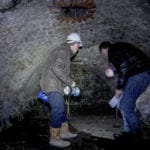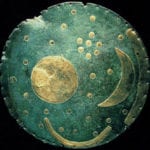 Weird Stuff
Weird Stuff  Weird Stuff
Weird Stuff  Miscellaneous
Miscellaneous 10 LEGO Facts That Will Toy with Your Mind
 Misconceptions
Misconceptions 10 Widespread Historical Myths and the Texts That Started Them
 Crime
Crime 10 Incredible Big-Time Art Fraudsters
 Movies and TV
Movies and TV 10 Most Influential Fictional Objects in Cinema History
 Our World
Our World Top 10 Real Almost‑Cities That Never Materialized
 Technology
Technology 10 Unsettling Ways Big Brother Is (Likely) Spying on You
 Music
Music 10 Chance Encounters That Formed Legendary Bands
 Space
Space 10 Asteroids That Sneaked Closer Than Our Satellites
 Sport
Sport The 10 Least Credible Superstars in Professional Sports
 Weird Stuff
Weird Stuff 10 of History’s Greatest Pranks & Hoaxes
 Miscellaneous
Miscellaneous 10 LEGO Facts That Will Toy with Your Mind
 Misconceptions
Misconceptions 10 Widespread Historical Myths and the Texts That Started Them
Who's Behind Listverse?

Jamie Frater
Head Editor
Jamie founded Listverse due to an insatiable desire to share fascinating, obscure, and bizarre facts. He has been a guest speaker on numerous national radio and television stations and is a five time published author.
More About Us Crime
Crime 10 Incredible Big-Time Art Fraudsters
 Movies and TV
Movies and TV 10 Most Influential Fictional Objects in Cinema History
 Our World
Our World Top 10 Real Almost‑Cities That Never Materialized
 Technology
Technology 10 Unsettling Ways Big Brother Is (Likely) Spying on You
 Music
Music 10 Chance Encounters That Formed Legendary Bands
 Space
Space 10 Asteroids That Sneaked Closer Than Our Satellites
 Sport
Sport The 10 Least Credible Superstars in Professional Sports
10 Haunted Tunnels With Really Creepy Backstories
Watch the video on YouTube: 10 Haunted Tunnels With Really Creepy Backstories
Old, dark places are prime candidates for ghostly tales. Tunnels add a touch of claustrophobia to the mix. Humans have been digging through things for a long time, so the world isn’t short of tunnels with more history than lighting. Whether people were crushed building them or run over by trains, many have lost their lives underground. Tunnels have taken their place in folklore, fascinating both ghost hunters and those of us with a general interest in the macabre.
10 The Screaming Tunnel
The legend of The Screaming Tunnel in Niagara Falls begins with a young girl that met an unfortunate fate. There are a few versions of the story, but each one agrees that that she lived in a farmhouse on the south side of the tunnel. One night her house caught fire, and she fled the building with her clothes ablaze. She reach the tunnel before she fell to the ground, and that is where she perished. Other tales say she was set on fire deliberately by her raging father, or that she was raped and burnt in the tunnel to hide evidence.
The legend says that if you stand in the center of the tunnel and light a match, the match will go out. You will then hear the screams of the dying girl.
The tunnel’s a popular destination for ghost hunters, and you can take it in as part of a guided tour, if you wish. YouTube hosts many videos of it, though none of them appear to have captured the actual scream. One video does have coyotes in the background, making high-pitched yelps, of the sort that might well sound like screams with a bit of echo.
9 The Blue Ghost Tunnel

No, the tunnel isn’t blue. The phantom that supposedly lived there is—and we only know about it thanks to a mistake.
A paranormal investigator was trying to find the Screaming Tunnel but got lost. He found himself at the much longer Merritton Tunnel, a rail tunnel in the nearby city of Thorold. There he claimed he saw a strange blue mist.The tunnel’s reputation soon surpassed its screamier cousin. The TV show Creepy Canada did a feature on it, prompting thousands of visitors a year. It’s a popular choice in lists of Canada’s most haunted places, and some have called it the most haunted one of all.
The ghosts here are said to belong to two rail engineers that died when the steam locomotives they were operating collided in 1903. One of the men became mangled in the boiler and died at the scene. When rescuers tried to pull him free, his legs came off. The fireman of the other train fell into the flames and suffered burns on 90 percent of his body. He died hours later at a nearby hospital. As an added bonus for hauntitude, when the canal that runs above the tunnel was built, it flooded a nearby cemetery.
The tunnel became so popular that authorities were forced to brick it up, and the tunnel may be structurally unsafe. Today, one of the paranormal groups that made it famous recommends avoiding it at night. You’re more likely to be threatened by a drunken youth than a dead rail worker (that’s true pretty much everywhere, to be fair).
8 Sensabaugh Tunnel
If you want a haunted tunnel in North America but don’t like Canadians and their mapley ways, there are plenty of tunnels in the US. Sensabaugh Tunnel is was built in Tennessee in the 1920s as part of a road and was named for the man that owned the land, Edward Sensabaugh. Old Ed features prominently in the legends behind the place. Your opinion on Ed is likely to be very different depending on which version you hear.
In the kinder version, Ed let a homeless man into his home as an act of charity. Their guest tried to steal jewelry, so Ed confronted him with a gun. The thief grabbed Ed’s baby daughter to use as a shield and ran out of the house. He got away and drowned the baby in the tunnel. Another version omits the homeless man, and paints Ed Sensabaugh as a madman that killed his entire family, baby included, and threw their bodies into the tunnel. However she died, that baby is said to haunt the tunnel today
Locals say that if you switch off your car engine in the middle of the tunnel, it won’t switch back on (dead babies love interfering with automotive electronics). You can also hear the baby’s cry and the approaching footsteps of Ed himself. An investigation by the Southern States Paranormal Research Society concluded that ghostly activity is sadly lacking, but they suggest an even more fascinating explanation for the tunnel’s reputation.
Edward Sensabaugh lived into his old age, not dying until the 1950s. None of his children died as babies. By the time Ed grew old, vandals and hormonal teenagers had taken to using the tunnel for their respective fun. Ed wasn’t happy about that fact—if you had your own tunnel, you’d probably not want teenagers ruining it either. Ed’s weapon was an unusual talent for mimicking animal cries. He would hide at one end of the tunnel and fill it with an eerie shriek, scaring off anyone hiding inside.
7 Victoria Park, Brisbane

The indigenous ghosts of Australia are mostly venomous, and carry their young in a pouch (where they suck ectoplasm from a teat). Sadly, these native spirits have been replaced in many places by European settlers. One of these invaders is a floating nun, reported as being around 300 centimeters (10 ft) tall, who resides in a railway underpass in Brisbane’s Victoria Park.
The most unusual part of this story is not the ghost, but the reaction of the local population. The ghost was first seen in 1903 and again in 1932, but a sighting in 1965 made the biggest impression. After four sightings in 10 days, reports of the ghost caught the imagination of locals. Around 5,000 people flocked to the area one night The crowds were so bad that police had to close a nearby road. At 10pm, around 1,500 people were packed into the tunnel, staring at the walls and waiting for the ghost to appear.
6 Moonville Tunnel
The town of Moonville, Ohio would probably be long forgotten if not for its rail tunnel. In fact, if the tunnel wasn’t there, the town might never have existed. The tunnel was built when a local landowner offered a shortcut to the rail company building a track toward Cincinnati. This allowed him to haul coal and clay, and a few small settlement sprung up for people to take advantage. Moonville was among them, and its population peaked at about 100 in 1870.
The railway around the tunnel seemed almost designed to be a deathtrap. It was thin, and it led out onto a trestle above a high canyon that was itself just wide enough to fit the rail tracks. Given that it was a significant shortcut compared to walking around the valley, at least five people died after being hit by trains, the most recent in 1986. The line is no longer in use, except by an infamous phantom.
There are a few stories of the ghost’s origins. In some versions he was simply a drunk who took the tunnel as a shortcut home. When he heard a train coming he waved his lantern at it, but it didn’t stop in time. One story says that during a hard winter the town was running desperately low on supplies. Trains were passing by but not stopping, so locals hatched a plan to get someone to stand in the tunnel and wave a lamp to stop the train. The person they chose fell asleep and ran into the tunnel too late. The train killed him.
The lantern waving man is said to still be there, trying to flag down trains with his lantern. Some reports say that the rail company installed a signal at the mouth of the tunnel, and told drivers to ignore any lights they saw inside. The story has inspired songs, and there’s even a novel about the story of a conductor that met an unfortunate fate there.
5 Gold Camp Road Tunnels
Gold Camp Road is a winding route through the wilderness of central Colorado. The 56 kilometer (35 mi) stretch has three tunnels, imaginatively named “one,” “two,” and “three.” A local legend says that a school bus full of children was travelling the road in 1987, when tunnel three collapsed on top of it and killed everyone inside.
Today, you can hear the giggles of children in the first two tunnels, but if you stand close to the entrance of the third you hear screams. When you pass through the third tunnel in your car, you will leave with mysterious handprints on your windows. People have even put videos of it happening online, with a “totally LEGIT” disclaimer.
Unfortunately, it’s not true. Or rather fortunately, because that means a bunch of children didn’t get killed. At least, if they did, no one has been able to find any mention of it in the news reports of the time. Tunnel three partially collapsed in 1987, but no one was hurt. Nevertheless, there are also tales of rail workers haunting the place (the tunnels used to be for railway lines) so you could catch a glimpse of one or those.
Even if you don’t experience anything out of the ordinary, the scenery is stunning, so you might prefer to visit during the daytime anyway.
4 Hoosac Tunnel

The Hoosac Tunnel in Massachusetts is an interesting piece of civil engineering. When it opened in 1876, it was the longest tunnel in North America (a title it kept for 40 years) and the second longest in the world. Yet the workplaces of the 19th century aren’t remembered for their safety culture, and those involving explosives inside mountains were worse than most. By the time it was finished, Hoosac Tunnel had very much earned its nickname: The Bloody Pit.
The worst of the many accidents during construction occurred October 17, 1867. Fumes leaking from a gas light met a candle and caused an explosion, sending a wave of flame and debris down the main shaft. Thirteen people died, and when a worker was lowered to investigate, he emerged sputtering and saying “no hope, no hope.” The shaft flooded, and bodies floated to the top. They were among 195 people killed during the 24-year project.
Tales of ghosts began even before the tunnel was finished. In 1865, three explosives engineers, known as Brinkman, Nash, and Kelley, were working in the tunnel. Kelley set off one charge too early, burying his colleagues. Kelley disappeared not long afterwards, and was found strangled to death in the tunnel. The murder was never solved. It may have been friends of Brinkman and Nash seeking vengeance, but many workers believed it was the spirits of the dead men that had done it.
Workers reported hearing moans of pain and were too scared to enter the tunnel at night. After the 1867 disaster, people reported seeing apparitions of miners on the mountainside. Not all reports of the ghosts are bad. Joe Impoco worked in the tunnel in the 1970s, and claimed that disembodied voices twice warned him of dangers, and saved him from being flattened by a train.
3 Shanghai Tunnels
For around a century, the city of Portland, Oregon was home to an unfortunate practice known as being Shanghaied. Men were kidnapped, locked up, and eventually forced to work on ships sailing to Asia. Women were kidnapped and sold for the same reasons they are today, to be forced to work as prostitutes. While there’s no direct evidence, local legend says that the victims were transported and held in the underground tunnel system beneath Portland’s Old Town.
This legend has made the tunnels extremely popular with ghost hunters. Most people that claim ghostly activity report a woman in a white dress. Others say they hear harsh male whispers, telling them to “get out” or, perhaps more worryingly, “stay.” Another ghost reported by the tunnel’s tour guides is Joshua, a 9-year-old boy who used to empty chamber pots for money.
The tour guides have a lot of stories of sounds and apparitions. While they may believe what they report, they do so with drama. The tunnel’s main curator, Michael P. Jones, has the demeanor of an unassuming horror film character. If nothing else, he was able to thoroughly creep out one local TV news presenter. If this was a horror film, she’d probably have been among the ghosts’ first victims.
2 Big Bull Tunnel

Big Bull Tunnel is a short rail tunnel in Virginia. If you’re wondering, there’s also a Little Bull Tunnel. If Virginia’s 19th century rail builders had a sense of humor Big Bull would be the shorter of the two, but sadly it’s about four times the length of its cousin. It’s also the home of some particularly nasty phantoms.
Two workers are known to have died in Big Bull. A man was scalped in 1901, and another fell off a train in 1904. Even before that, locals had claimed the tunnel was haunted. The legend became prominent in 1905, when a freight train broke down just outside the entrance. One of the trainmen tried to hurry back through the tunnel to put warning flags on the other side, but he returned to his two colleagues pale and shaken.
He claimed to have heard noises “no man could stand.” The other two went to investigate, and they heard groans and screams of pain coming from the walls. The bravest of the three asked aloud what was going on.
“Remove that awful weight from my body,” came the first reply, before a second voice said “they are drinking my blood.” The men tried to find a gap or a crack—maybe someone was playing a trick—but there was nothing. They made a swift exit, and the Pittsburgh Press reported that the story was “generally credited” by others at the time.
1 Church Hill Tunnel
The collapsed railway tunnel under Church Hill in Richmond, Virginia has the distinction of being haunted not just by ghosts, but also by a vampire. The tunnel originally opened in 1873 but closed in 1902. It was in the 1920s, with a growth in both the city’s population and economy, that the local rail company decided to reopen the 1,200 meter (4,000 ft) tunnel. It needed to be cleaned and reinforced before it was ready for use.
On the afternoon of October 2, 1925, 200 men were working in the tunnel. They stood on flat cars, pulled by a steam locomotive, working on the tunnel’s roof. The ceiling above the locomotive collapsed, burying the train in rubble and clay near the western entrance. Steam squirted from the squashed boiler, scalding the train’s fireman. He was able to crawl out of the tunnel to the east, but he died of his injuries in the hospital.
The train’s driver came off even worse. He was found dead after an eight day rescue operation, buried in the cab. He was badly burnt and a lever was jammed into his chest. Record keeping was very informal, and most of the workmen were day laborers, but at least one other person was never recovered. The locomotive, and likely a few bodies, are still in the tunnel. It’s since been filled with sand and the entrances blocked with concrete.
Those near the tunnel have reported hearing a number of sounds. Voices saying “get me out,” the sound of digging, and even the screech of locomotive wheels have all been reported. The Richmond Vampire, a famous resident of a nearby cemetery, is said to have feasted on the dead workers. Rescuers in the days after the collapse found him crouched over a body, before seeing his bloody fangs. They chased the vampire back to the crypt of a man that had died in 1922.
That grave has since been padlocked, and the bodies inside have been removed. It suggests an interesting scenario, though. If the Richmond Vampire did indeed feast on the blood of the trapped workers, then perhaps some of them turned. Could the noises people hear perhaps come not from ghosts, but from immortal vampires that have been waiting 90 years for their first drop of blood?
Alan doesn’t believe in ghosts, but he does find local folklore utterly fascinating. He’s also a bit of an armchair urban explorer, so enjoyed researching abandoned tunnels a bit too much.








